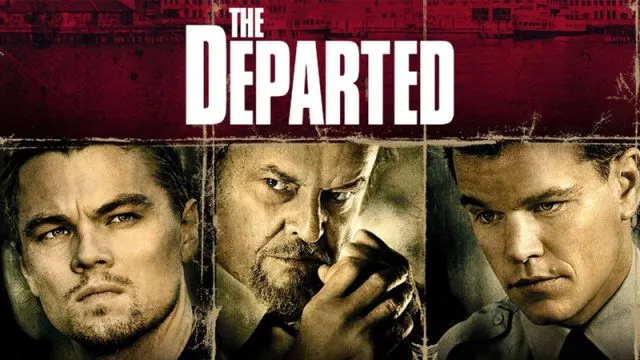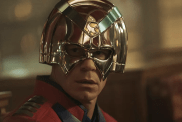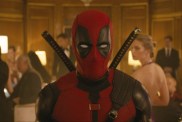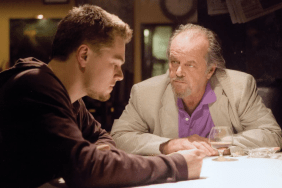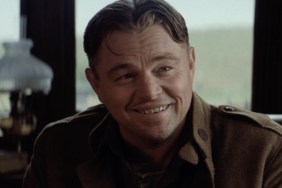Martin Scorsese’s Academy Award-winning crime drama The Departed turns 15 this week, people. Looking back on the flick, I’m still amazed at its ability to entertain, dazzle, thrill, and shock audiences. Honestly, check out this terrific “first-time reaction” from a couple on YouTube if you need a reminder of just how bonkers the 2006 film really is:
Personally, I love The Departed. It has all of Scorsese’s usual flourishes, a fantastic, whip-smaht script by William Monahan, and plenty of intrigue boiling underneath the surface.
The pic also features one helluva cast, namely Leonardo DiCaprio, Matt Damon, Jack Nicholson, Ray Winstone, Martin Sheen, Vera Farmiga, Alec Baldwin, and Mark Wahlberg. Seriously, you can’t get any more all-star than that.
But which one of these actors truly owns The Departed? I’m narrowing this contest down to DiCaprio, Damon, Nicholson, Farmiga, and Wahlberg, mostly in the interest of time, even though you could make a case for Sheen’s genial Queenan, Baldwin’s smooth-talking Ellerby, and Winstone’s steely-eyed Mr. French.
I’ll make my case for each actor and let you sound off with your picks below!
LEONARDO DICAPRIO — BILLY COSTIGAN
For about 95% of The Departed, it feels like a Leonardo DiCaprio film. As in, it revolves around his character, the choices he makes, and his exhaustive duties as an undercover police officer. We want to see him catch Matt Damon’s slippery mole, bring down Jack Nicholson’s near-satanic Costello, and run away with Farmiga’s Madoyln.
Then that famous elevator bit happens, and Scorsese pulls the rug out. I still hate the big twist but understand its necessity in the grand scheme of the picture — this is a statement movie disguised as a character study. In the end, the story was never about any one of these characters, and really a case study in the ever-escalating ramifications brought about by lying, deceit, and violence. Every character in The Departed is, to some degree, lying or pretending to be something they’re not; and each suffers as a result.
Violence begets violence, and eventually, the cumulation of lies reaches their breaking point.
Still, as Billy, DiCaprio does his best iteration of DiCaprio — i.e., lots of yelling — even if a majority of his performance takes place by way of conversation over a cell phone.
The argument against DiCaprio is that he never has the one moment to truly stand out. His performance on a whole is really good, and the man does a great job of showing the mental gymnastics Billy must undertake to fit in with the bad guys. And yet, his performance is cut short by the shocking twist, so much so that the bit tends to overshadow everything that came before.
Plus, it’s worth noting that Billy’s death doesn’t evoke an emotional reaction outside of, “Holy s—!” We’re stunned, sure, but the character’s demise isn’t really sad or even heartbreaking so much as it’s a kick in the nuts.
RELATED: Matthew Vaughn’s New Star-Studded Spy Film Argylle Begins Production
MATT DAMON — COLIN SULLIVAN
The Departed is Damon’s best performance/role to date. He’s so good in the film you almost forget that he’s in the movie. After so many great turns as a hero (Bourne), roguish do-gooder (Good Will Hunting), and likable criminal (Oceans), it’s surprising how well Damon slips into the slimy skin of Sullivan.
Part of the charm comes from the way Damon plays the character as an innocuous lad who just wants to rise to the top by any means necessary. He wants the apartment, the girl, the respect, and the job, but is weighed down by the very elements helping him achieve the status he so desires.
Ultimately, and this is something I realized on my second or third viewing, The Departed is mostly Sullivan’s story. We see the character as a young kid who unknowingly or not makes a deal with the Devil to attain his aspirations. Like Costigan, Sullivan spends most of the movie dealing with the consequences of his choices. If anything, Sullivan has it worse because I think he is a good guy who convinced himself that his poor choices ultimately serve the greater good, even if his intentions are mostly selfish. So, he’s a good guy doing bad things in order to be a good guy … Sullivan genuinely wants to be a good police officer, but he also wants to (and must) impress Nicholson’s abusive father figure. He’s backed into a much trickier corner than Costigan.
My favorite scene with Damon is the quiet moment he spends alone in his office after Queenan and a number of cops are killed as a direct result of his poor (albeit desperate) decision-making. I love the way he flips off the lights and sits in darkness as though doing so will hide him from the truth of his actions.
There’s also the running theme of impotence prevalent throughout the movie. Sullivan’s guilt clearly weighs on him enough to where he can’t perform in the bedroom, and the nonstop sexual abuse he endures from Costello clearly has an adverse effect on his being.
Sullivan is a fascinating character. A villain, for sure, perhaps the most despicable villain to hit the screen in the last 15 years, but he’s also relatable in his selfish quest for respect; and something of a tragic figure considering his early induction into the world of crime. Damon’s pitch-perfect exacerbated delivery of, “Okay,” just before Sullivan bites the dust is both haunting and hilarious, a satisfying, though ultimately cold end to a man who deserved far better and worse.
JACK NICHOLSON — FRANK COSTELLO
Jack Nicholson is one of the greatest actors of all time. Look down his resume and you’ll find the likes of One Flew Over the Cuckoo’s Nest, The Shining, As Good as It Gets, and many others, any of which would mark career highs for ordinary talent. That said, the man had on occasion a propensity for overdoing it, as was the case with his role as the Joker in Tim Burton’s Batman and even his overarching performance as Frank Costello in The Departed.
Look, Nicholson is really good in The Departed, but also a bit distracting. So much so that he often overwhelms the picture with his bizarre shenanigans when a more subtle approach might have been more appropriate. Too many times it feels like the veteran actor is trying to steal the scene from his young co-stars, even when it’s not entirely necessary.
Also, I’m not entirely sure what they were trying to say with Costello’s character. At one point he holds a severed hand while balking at his mistress’ insistence on going to choir practice. Later, we see him nonchalantly emerge from a bar covered in blood … and then we cut to another scene.
RELATED: Don’t Look Up Teaser & Photos: Leonardo DiCaprio Leads Netflix Pic
I suppose the point is to show just how deranged Costello has become, which obviously makes him dangerous, but these bits also never felt necessary to the overarching plot. We get that Costello is bad simply because of his operation and the Massachusetts State Department’s desire to bring him down. Simply put, there are more creative ways to show his villainy, but Scorsese and Nicholson go for the most obvious approach.
Then there’s the not-so-subtle sexual overtones of the film. Clearly, something’s up with Costello’s sex life. The man is overaggressive to the nth degree in a manner that suggests he’s trying to hide something. In one scene, we see his wife reading a “How to Get Pregnant” book, and in another, he throws coke on a couple of prostitutes but doesn’t engage in any sexual activity. And it is telling that he whips out a fake penis to shock Sullivan in a porn theater, which begs the question, “Why does Costello have a fake penis lying around his apartment?”
A lot of this stuff is interesting and results in more layers to a film already jam-packed with layers, but such character flourishes are also a little to, ah, on the nose, as my brother likes to say. Or maybe excessive is the better word. Often, it feels like Scorsese caving into his legendary co-star.
Tellingly, in an interview with New York Magazine, Nicholson revealed that he initially turned down the role because there wasn’t much of a part, and only agreed to do The Departed after his role was greatly increased.
Again, he’s not bad in the film. Not by a longshot. In fact, one of my favorite scenes is the bit where Costello, clearly unhinged, accuses Costigan of being the rat in his outfit:
There’s some good stuff here, along with the scene where he asks Costigan if he ever thought about going back to school — a subtle line that adds a smidgeon of humanity to his character.
Ultimately, when Costello dies, you don’t really miss him. In truth, The Departed is at its best when it focuses on Costigan and Sullivan and the suspense that arises from their duplicitous nature.
VERA FARMIGA — MADOLYN
At first glance, Madolyn serves only to provide an emotional (and ridiculously coincidental) connection for Costigan and Sullivan. Except, the film goes to great lengths to show her character change throughout the production.
When we first meet her, Madolyn is a simple psychologist who doesn’t quite get the gist of her responsibilities. Her first date with Sullivan shows her naivete as she’s unwilling to discern a lie from the truth.
Later, in her first meeting with Costigan, Madolyn struggles to completely understand her patient’s plight and loses her cool when Billy has the audacity to actually tell the truth.
Interestingly, Madolyn makes the difficult decision to lie to Sullivan about “their” child late in the film, which racks her with guilt until she learns the truth about Sullivan — “You know, I thought I was the liar,” she says.
Still, the most pivotal moment comes when she completely disregards Sullivan at Costigan’s funeral.
Despite everything that happens throughout the film, Sullivan still believes he can make everything work. He is so caught up in his lies that he no longer recognizes how faulty his well-constructed façade truly was, and can no longer recognize when others are lying to him.
Madolyn, on the other hand, recognizes the truth and succinctly eliminates any and all BS from her life as a result. Out of everyone in the film, she is perhaps the only character who actually learns anything and comes away stronger as a result.
MARK WAHLBERG — SEAN DIGNAM
Dignam is the best thing about The Departed, in my opinion. Sure, DiCaprio and Damon have the meatier roles, Nicholson gets all the scene-chewing shenanigans and Farmiga enjoys the best character development, but Mark Wahlberg’s overly aggressive staff sergeant stands out from the pack because, well, the role fits the actor like a glove.
I think what makes Dignam really stand out from the rest is that he’s the only one not lying or playing a part. He is who he is. He tells it like he sees it. If he likes you, you’ll know. If he doesn’t like you, you’ll know even more.
There’s a scene midway through the film where Dignam engages with Costigan over the phone and the camera lingers on his left hand to show a wedding ring — which more or less goes hand in hand with Alec Baldwin’s statement to Damon’s character later in the film:
Dignam is a straight shooter, a good cop, and clearly passionate about the law. That “he has a style we all have to grow accustomed to,” I believe, is a sly way of saying he’s one of the few good ones who won’t lie to your face in a police department full of untrustworthy agents. The character is also loyal to a fault, a clear hater of rats and informants, and a believer in the system, which is why he doesn’t shoot Costello in the face when they meet late in the film.
Also, Wahlberg absolutely owns the role:
Dignam has the greatest impact on the plot because he’s the only one operating outside of it. He may be an overaggressive ass, but he’s also the only one who has what it takes to see the job through to the end.
Is it any wonder that, of all the characters in The Departed, he’s the one left holding the gun in the final shot?
Those are my overviews of The Departed’s top characters. What say you? Who is the best character/actor in The Departed? Sound off below!
